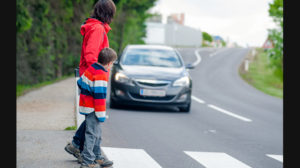
For safety, both pedestrians and motorists need to avoid distractions and pay attention to their surroundings.
“I didn’t see them!”
That’s usually the first thing someone says when they’ve been involved in a vehicle-pedestrian crash.
The latest statistical year shows that 5,977 pedestrians were killed in U.S. traffic crashes – one every 1.5 hours, according to National Highway Traffic Safety Administration figures. In addition, 129,000 pedestrians were treated for non-fatal crash-related injuries. While these figures remained about steady compared with the prior year, the numbers are still alarming.
BEHIND THE NUMBERS
Why are there still so many pedestrian injuries and deaths? Unfortunately, there’s no one reason for these events, but distractions by both drivers and pedestrians account for a significant number, National Safety Council figures reveal.
How do we keep pedestrians safer? Most of us are sometimes driver and sometimes pedestrian, so we need to approach safety from the perspective of each.
WHAT A PEDESTRIAN CAN DO
Pedestrians need to be diligent about their own safety and not assume a driver sees them. Even though traffic regulations favor pedestrians, that’s little comfort if you’re not seen by a driver.
The best option for the pedestrian is to pay attention.
- Put the phone and the earbuds away!
- Listen and look.
- Be visible (wear light colors and reflective clothing after dark, and avoid dark clothing).
- Look both ways before crossing a street (still holds true from when you were a kid).
- Always cross in a crosswalk.
- Walk defensively.
WHAT A DRIVER CAN DO
What about as a driver? Same thing – put the phone away and limit distractions!
- Don’t clutter your dashboard or rear-view mirror with items that would obstruct your view.
- Keep windows clean and unobstructed.
- Be alert in residential areas and school zones and at crosswalks and bus stops.
- Watch for children, pets or balls that come into a street – where a ball goes, a child usually follows.
- Make eye contact with pedestrians to ensure that they see you and you see them.
Today’s streets and highways are home to a variety of transportation modes – pedestrians, motorized scooters, bicycles, skateboards, motor vehicles – and we all share the roads, so we have to be aware of our fellow travelers.
Most importantly, we must keep in mind is that all parties need to practice patience! It’s much easier to take seconds to be safe than to risk a lifetime of regret.
MORE INFORMATION
National Highway Transportation Safety Administration’s Pedestrian Safety page
National Safety Council’s Pedestrian Safety page
Centers for Disease Control and Prevention Pedestrian Safety page
This loss control information is advisory only. The author assumes no responsibility for management or control of loss control activities. Not all exposures are identified in this article. Contact your local, independent insurance agent for coverage advice and policy service.
